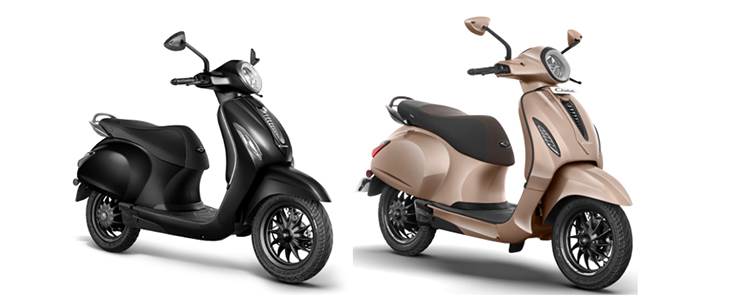Bajaj Auto’s all-electric Chetak scooter turns four today. Launched on January 14, 2020, the zero-emission avatar of the iconic Chetak scooter that scores of Indians learnt to ride on, it was one of the most-awaited two-wheeler launches at the time.
The Chetak’s launch took place just about two months before the world and the automotive industry per se was brough to a grinding halt by the Covid-19 pandemic. Initially, the Chetak’s sales, conducted from KTM outlets, were confined to only two cities – Pune (4 outlets) and Bengaluru (13 outlets) – and understandably customer offtake was slow. Between January 2020 to end-March 2021, 1,587 Chetaks were sold in India. While FY2022 saw total sales of 8,187 units, Chetak numbers rose by 284% YoY to 31,485 units albeit on a low year-ago base.

In the first nine months (April-December 2023), Chetak sales at 75,999 units are up 188% YoY (April-December 2022: 26,409 units).
It’s in the current fiscal (FY2024) that the Bajaj Chetak has really come into its own. In the first nine months (April-December 2023), the e-scooter’s wholesales at 75,999 units are up 188% YoY (April-December 2022: 26,409 units). This constitutes 65% of the e-scooter’s total sales of 1,17,208 units since launch and has now suddenly made the competion stand up and take notice.
With an expanded network and ramped-up production, the Chetak has averaged monthly sales of 6,333 units this fiscal. This rapid increase in sales meant that the Chetak surpassed the 100,000-units milestone in November 2023. A month later, the EV recorded its best monthly sales (December 2023: 13,008 units).
 While the Chetak Urbane (left) was launched in early December, Bajaj Auto launched the range-topping Urbane Premium variant on January 5.
While the Chetak Urbane (left) was launched in early December, Bajaj Auto launched the range-topping Urbane Premium variant on January 5.
Two new variants in two months
On December 1, 2023, Bajaj Auto launched a new avatar called the Chetak Urbane, which costs Rs 115,000 in its standard form, and Rs 121,000 for an additional ‘Tecpac’, which unlocks more features and performance. The company website lists the Chetak Urbane as having slightly higher range (113km) than the original Chetak (108km). However, in the case of the Urbane, this is the IDC-certified range, while for the current Chetak Premium, 108km is its claimed real-world range (its IDC rating is 126km). The new Chetak Urbane gets the same 2.9kWh battery capacity as the current model.
The Chetak Urbane utilises the same colour LCD display as the Premium variant. In standard form, the Urbane offers a 63kph top speed, and comes with only one riding mode – Eco. With the ‘Tecpac’ installed, top speed rises to 73kph and the user gets a Sport riding mode as well.
On January 5, 2024, the company introduced the updated range-topping 2024 Urbane Premium variant, priced at Rs 135,000 (ex-showroom). The most significant change is the new 3.2 kWh battery pack rated for a claimed IDC range of 127km on a single charge.
Chetak’s rising sales and EV market share
Bajaj Auto, which is among the three legacy players along with TVS Motor Co and Hero MotoCorp to have plugged into e-mobility, is hard on the heels of Ather Energy, which has registered wholesales of 72,842 units between April-December 2023, 3,157 units fewer than Bajaj Auto. On January 10, Ather Energy, which is India’s No. 3 e-two-wheeler OEM after Ola Electric and TVS Motor Co, slashed the price of its entry-level 450S e-scooter by Rs 20,000 to Rs 109,000. This is perceived as a move to take on the base models of key rivals like the Bajaj Chetak Urbane (Rs 115,000), TVS iQube (Rs 134,000) and Ola S1 Air (Rs 120,000).
The Bajaj Chetak had a market share of 13% in November 2023, quite a jump from the 4% it had in January 2023. The company is looking to ramp up production as well as expand its network of exclusive Chetak showrooms. The Chetak network, which has a presence in 141 cities across India, is to be expanded to 250 cities by March 2024.
ALSO READ:
TVS iQube and Bajaj Chetak ride surging wave of EV demand in India
